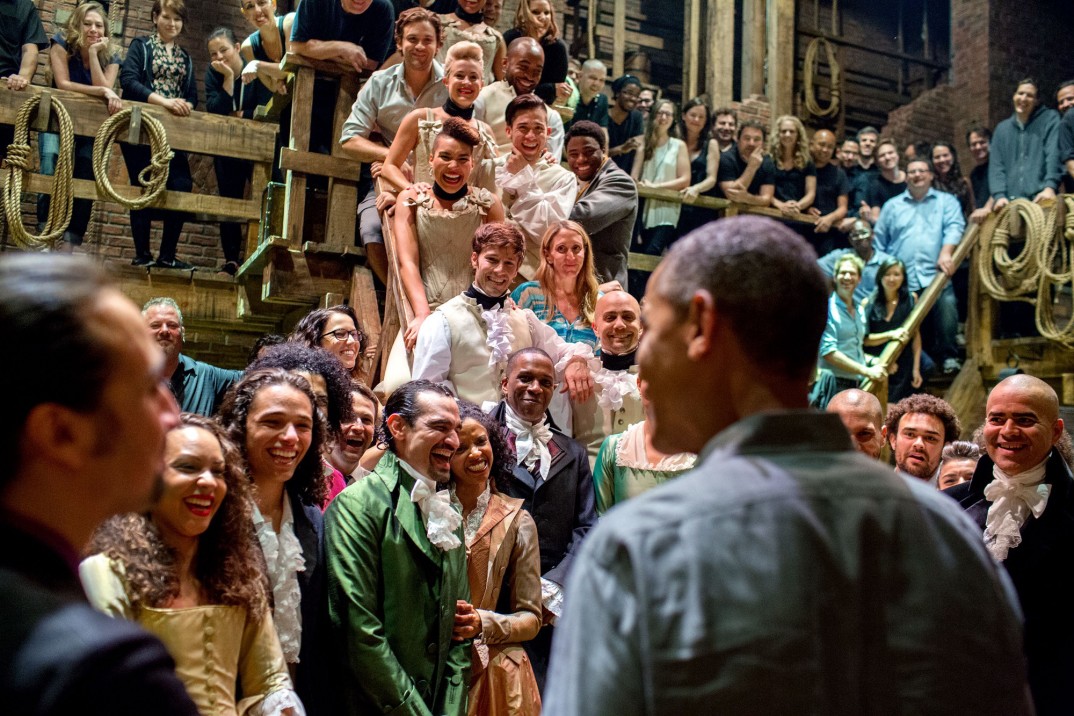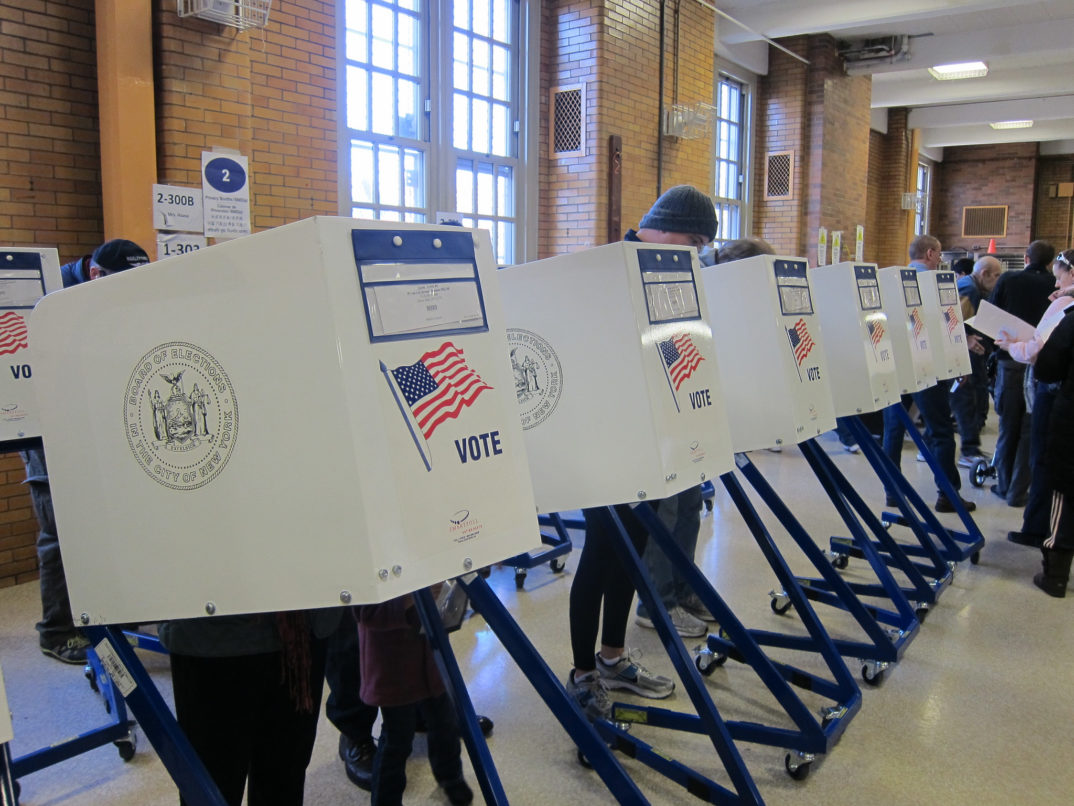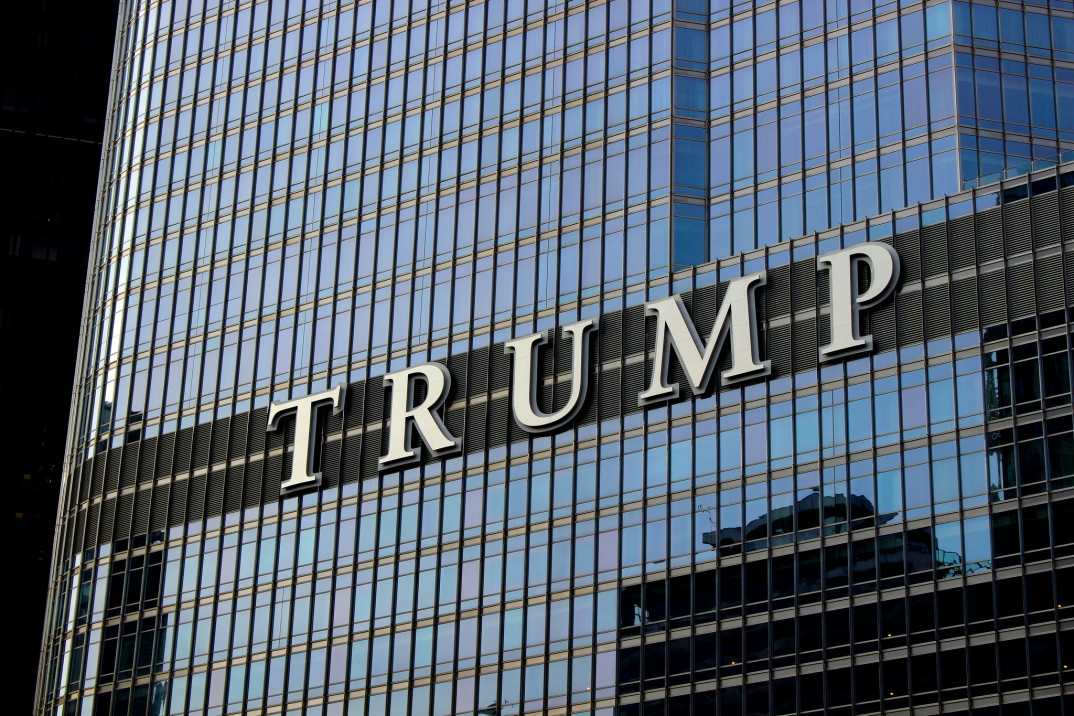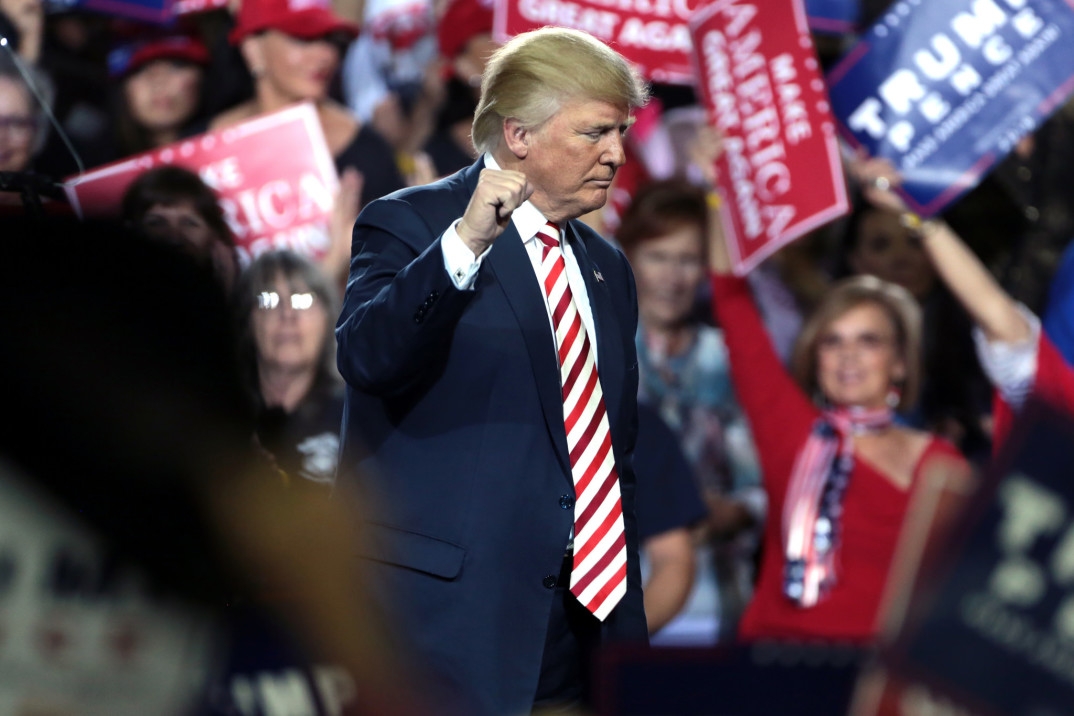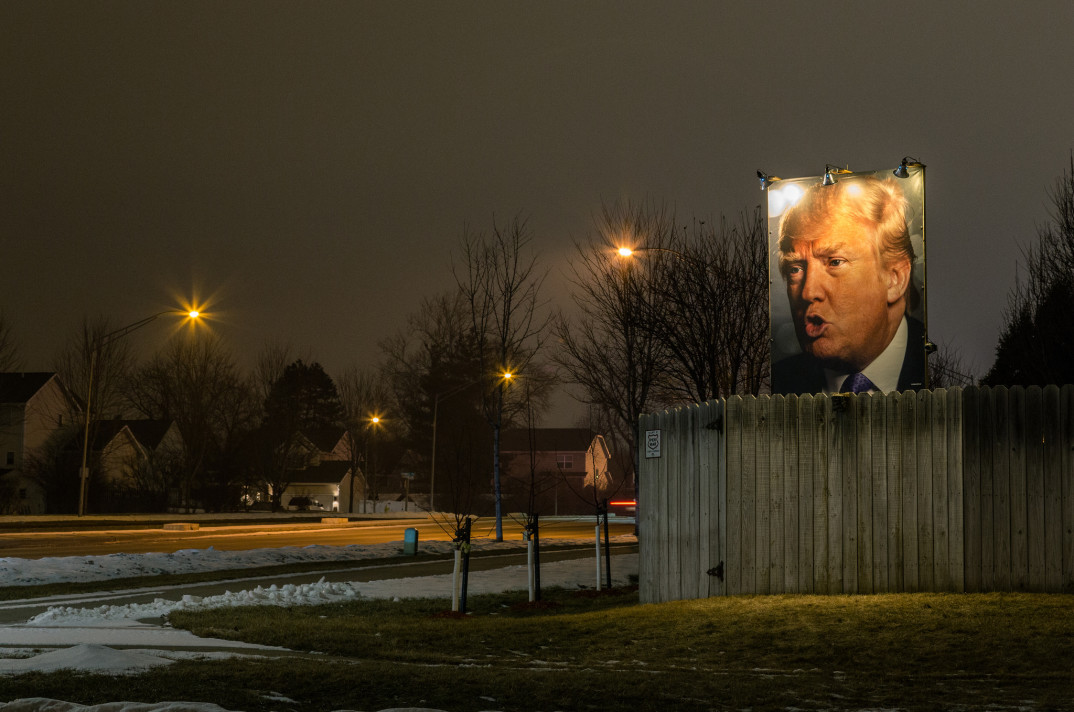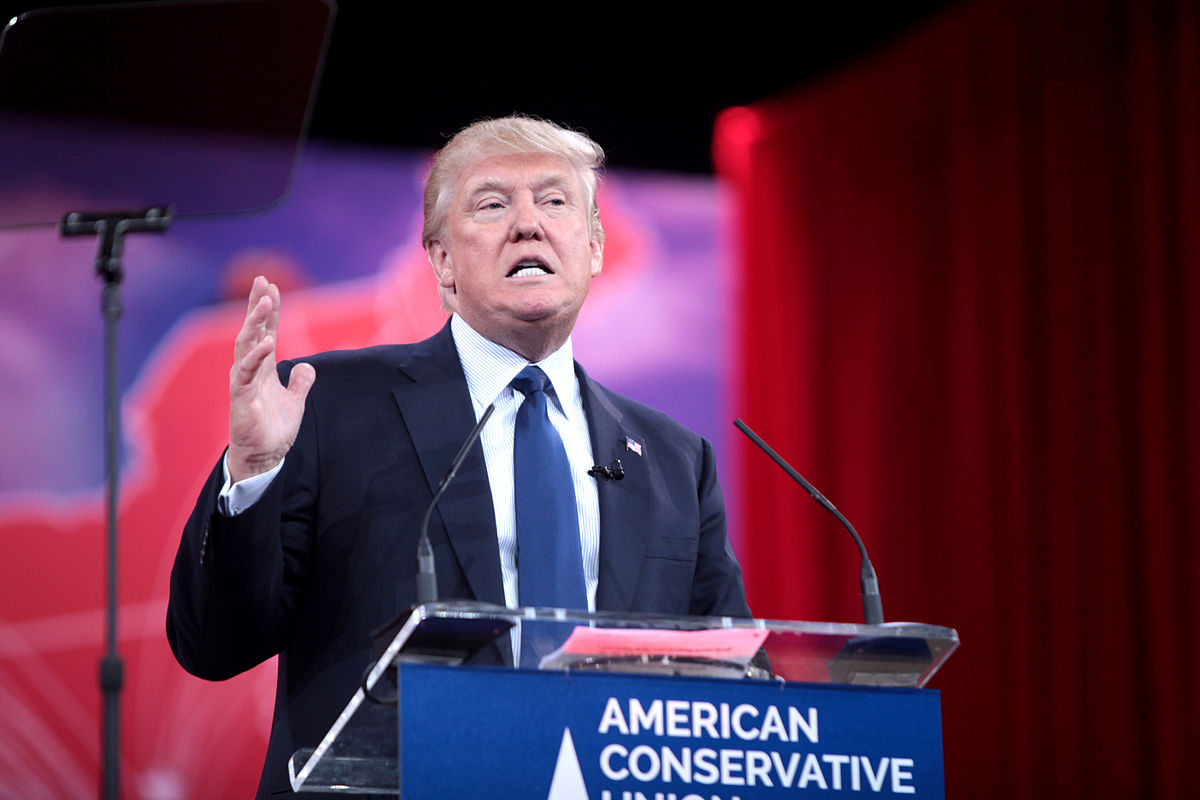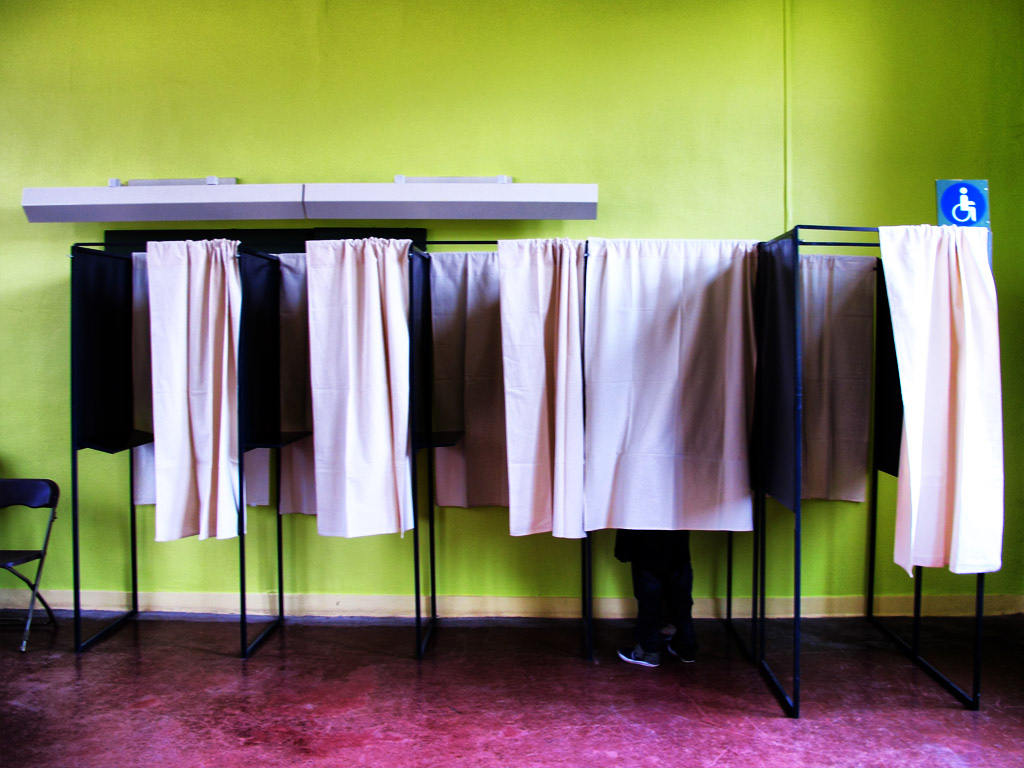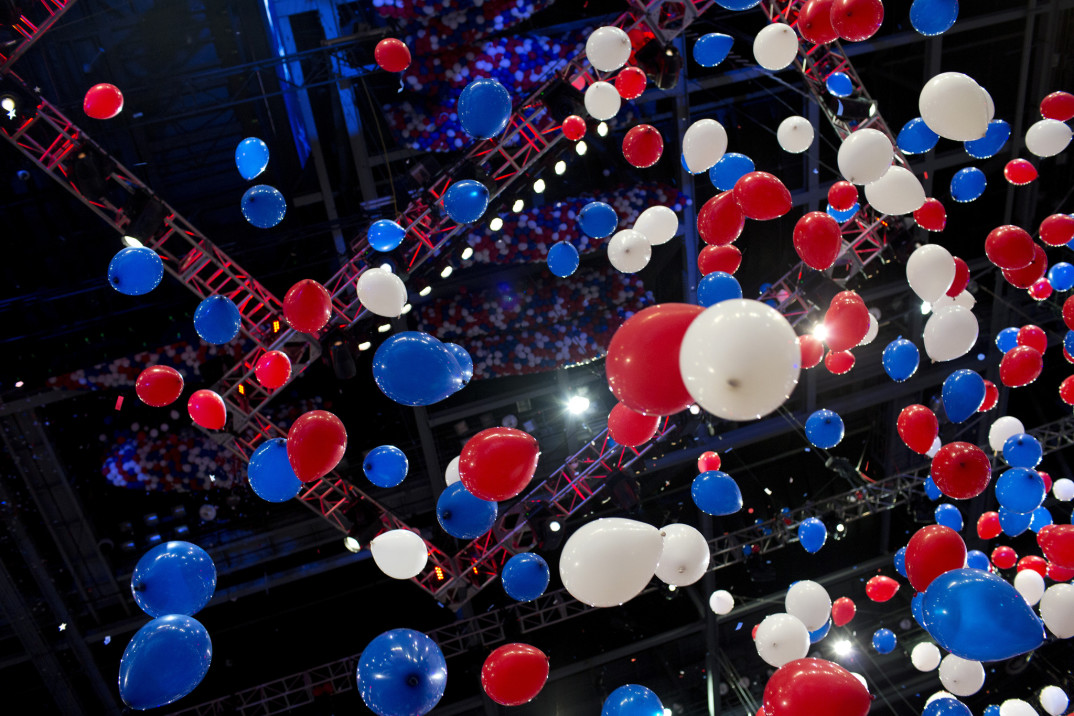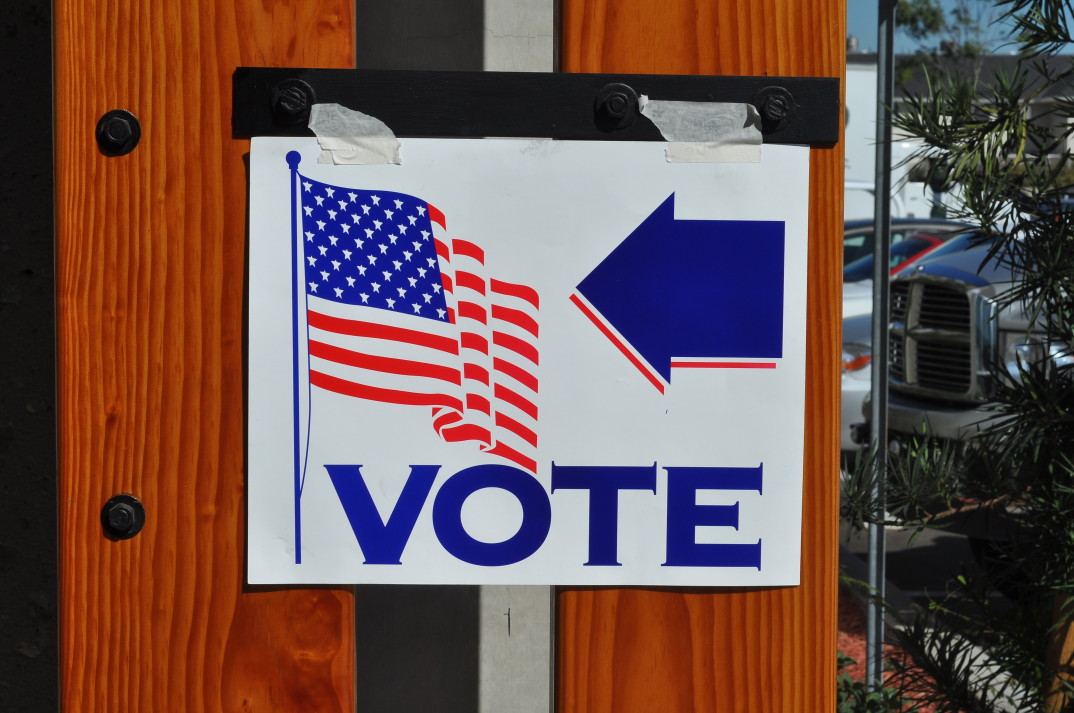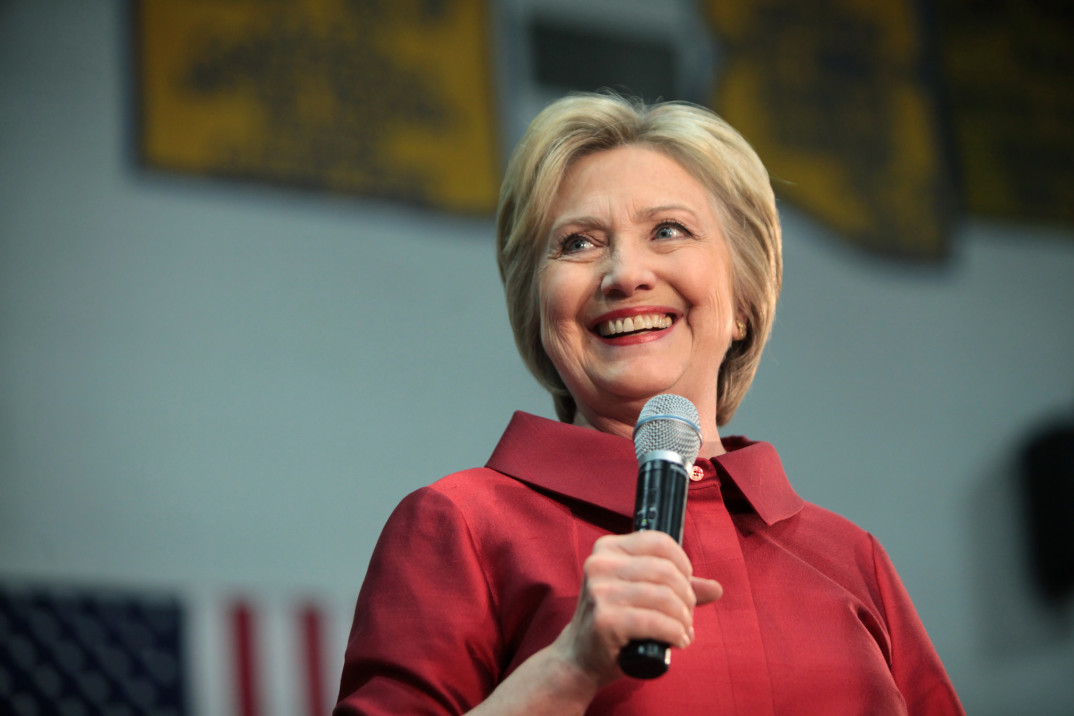Recently, Vice President-elect Mike Pence attended a performance of the smash Broadway musical, Hamilton. During closing curtain remarks, Pence was directly addressed by the cast of the musical. The address encouraged Pence and the rest of the Trump administration to uphold their promise to truly be an administration working toward the welfare of all Americans. The cast expressed that the diversity represented in their multi-ethnic retelling of the founding of America is a true representation of the American dream and that Trump’s administration should respect the diversity so cherished in American values. You can view the full video of the address here.
The Church of Trump?
Shortly following Trump’s victory as the new president-elect, a pastor in Seattle came to work to find his church branded in paint with “F*** organized religion”. Bewildered, the pastor was unsure whether this resentment was harbored towards his church or towards Trump’s victory. Many would question whether these two subjects can be divided at all. After all, evangelical Christians played a dominant role in this election as they represent a quarter of the U.S. population. Although the mingling of evangelical Christianity and conservative politics is not new, Donald Trump played a unique role as the champion of white evangelical Christians while also revealing how disparate this voting population can be.
Compulsory Voting in America
This article has a set of discussion questions tailored for classroom use. Click here to download them. To see a full list of articles with discussion questions and other resources, visit our “Educational Resources” page.
Voter turnout in America is infamous for being extraordinarily low. Consistently, between 50% to 60% of eligible voters actually turn out to vote in presidential election year; the number is even lower during midterm elections, when the election is perceived as lower stakes. The 2014 midterm elections saw a dismal turnout of 36%. In 2016, voter turnout was at a 20-year low, with 55% of the age-eligible population voting in the presidential election. This means that a very small percentage of the country actually votes for the winning presidential candidate, and/or the members of both Congressional chambers, and that nearly half the country does not participate in the selection process. Some countries have taken what appears to be a drastic approach to resolving this problem: compulsory voting.
More than 20 countries around the world have adopted compulsory voting programs. Compulsory voting is just what it sounds like: by law, all those who are eligible to vote must vote. While compulsory voting sounds like a policy that would take place in an authoritarian regime at first glance, compulsory voting laws tend to have relatively lax punishments for refusal to vote. The Atlantic reports a $20 to $50 fine in Australia for those who fail to have an excuse for not voting, and no laws prohibit voters from simply turning in a blank ballot if they so choose. Turnout in countries with compulsory voting can be as high as 85%. This turnout remains consistent in most elections. Due to the strikingly low voter turnout in the U.S., President Obama endorsed the idea in 2015 when asked about economic inequality.
A compulsory voting law may in fact be beneficial for the U.S. Countries with compulsory voting laws have lower wealth inequity, next to no political corruption, and higher faith in the democratic process. Working class voters who tend to not participate in elections or those voters disengaged from the political process would have to get involved; Australia also experienced a low voter turnout rate before switching to compulsory voting in 1924. Voter disenfranchisement has been a hot topic across the nation for years – whether it’s voter ID laws that restrict access to the polls, elections happening on days in which low-income workers find it nearly impossible to get off work, or polling locations that are not easily accessible. Therefore, the well-off have significantly more power in politics than the average citizen. Compulsory voting laws would serve to level the playing field at least somewhat, giving those who are typically underrepresented a more significant voice, thus forcing politicians to address the needs of those communities.
Some of these issues could also be resolved through expanding access to voting. Some proposed solutions include extending early voting, moving Election Day from a Tuesday to a weekend, automatic registration upon receiving a driver’s license. One issue with compulsory voting laws is enforcement – a $20 to $50 fine every two years isn’t a steep enough fee that most households can’t pay it and have to vote. Laws like this are difficult to enforce when the consequences are not steep. Other experts told Business Insider that, since Americans tend to value individual liberty very highly, adding another mandatory civic duty on top of taxation and jury duty would generate too much political backlash. Finally, compulsory voting tends to make the country swing to the left, since many non-voters lean Democratic. Therefore, predominantly Republican states would likely not support the laws on a state level, and the federal level would likely not be able to implement the laws if Republicans held both or either chamber and/or the White House.
Given that such a low percentage of Americans actually vote in elections, some changes to the voting system need to be made to ensure that Americans are fairly getting their say in elections. While compulsory voting may never be a policy in America, or at least not in the foreseeable future, taking steps to improve voter turnout by revamping the voting process would be beneficial to those who are underrepresented in our democracy.
Is Sport the Opium of the People?
The Chicago Cubs have won the 2016 World Series. The curse is finished; after 118 years, the wait is finally over. Who the hell cares? Well, a lot of people. There has been an unusual hype regarding this sporting event. Five million fans showed up for the celebration parades.
Shared Grief Does Not Always Unite
The past few weeks have been hard for those who are fervently anti-Trump. On the weekend after the election, I was playing with my baby daughter, and made a comment about how empathetic I am.
My partner, who was lying on the couch next to me, muttered sarcastically: “Why don’t you go empathize with the white working class.”
My reaction was immediate, unreflective, and dramatic: I started shouting at him. That comment was uncalled for, utterly gratuitous! I was on the same side as his! I in no way thought that white men were more deserving of empathy than others, as I took him to imply. Finally, I started using expletives, and told him to f*ck off.
Yes, I told my beloved partner, a man of color who has been grieving the electoral result and has found it hard to get out of bed since then, that he could f*ck off.
Wearing a Safety Pin: Activism or Slacktivism?
In the wake of the recent, controversial presidential election, many Americans are sporting safety pins as a form of silent protest. Inspired by a similar safety pin (#SafetyPin) movement in the post-Brexit United Kingdom, the safety pins are meant to symbolize their solidarity with American immigrants (and anyone else) who may be fearful of their future during Donald Trump’s time in office. While there is no dispute that the safety pin wearers usually mean well, many critics say that one small display of support is not enough.
Continue reading “Wearing a Safety Pin: Activism or Slacktivism?”
Reconsidering the Electoral College
In the early hours of the morning on November 9th, 2016, it became clear that Donald Trump would be the next President of the United States. Though vote counts within many contentious states were close, he won the Electoral College handily—with Michigan still outstanding, Trump received 290 Electoral College votes and Clinton received 228. Despite his Electoral College victory, Trump appears to have lost the popular vote. This is the second time that this has happened in the 21st century. In 2000, Al Gore won the popular vote while George W. Bush won the Electoral College.
A Nation-Sized Conflict of Interest
The election of Donald Trump is in many ways unprecedented, and among the most puzzling effects might be how the president-elect will have to deal with his financial and legal obligations. The New York Times predicts that “a theme of Mr. Trump’s presidency is likely to be the clash of his duties running the country with the remnants of his decades as a hard-charging businessman.” Though relatively little legal precedent exists for the scale of Trump’s financial dealings, some things are established: the Trump family can continue to run their businesses, but Trump will not be immune to any court proceedings against him.
Donald Trump as Anti-Establishment Figure: A Failure of Language
Given the vitriolic tenor that has characterized the 2016 Presidential election, few expected it would end with such silence. By the end of Election Day, what few had expected became a national reality – despite losing the popular vote, Trump had secured the White House with a commanding lead in the Electoral College. What was once unthinkable for many had happened, leaving the country struggling to describe what they had witnessed.
Continue reading “Donald Trump as Anti-Establishment Figure: A Failure of Language”
Standing Still in Las Vegas
The Bellagio fountains go off four times an hour once sunset comes to the Las Vegas Strip. Each show is no doubt impressive, sending plumes of water spiraling into the air as echoes of pressurized cannons thunder through the plaza. Yet, by the third or fourth performance, the fountains begin to lose their luster. And after a few days of walking past them, they ultimately fade into the mundane, one of many once-in-a-lifetime spectacles vying for oxygen on the Strip.
Evaluating Donald Trump’s “Straight Talk”
It seems every time Republican presidential nominee Donald J. Trump takes the stage, something he says is met with outrage. These inflammatory statements range from harmless hogwash to potentially misogynistic or racist judgments. His competitor, a seasoned politician who understands the consequences that result from disregard for political norms, does not have these problems. Hillary Clinton chooses her battles and words with caution.
Continue reading “Evaluating Donald Trump’s “Straight Talk””
Trump and the Latin American Left: Strange Bedfellows
Back in July, during the Republican National Convention, some strange images circulated on the internet. Some tough-looking, blue eyed, blond cowboys, held signs with the curious phrase, “Latinos para Trump.” Obviously, something was not right about these pictures. Although Latinos are an ethnicity and not a race, and there are plenty of blue-eyed, blond Latinos, those holding the signs just didn’t look like the conventional Latino one would expect to find in the United States.
Continue reading “Trump and the Latin American Left: Strange Bedfellows”
Why The U.S. Should Embrace Instant Runoff Voting
Most Republicans don’t want Donald Trump as the nominee. Most Republicans didn’t want Trump during the primaries. He benefited from a crowded field of traditional candidates in the early primaries. The preferences of voters who voted for the third place candidates and beyond were simply lost. They had no say between the first and second place candidates.
Continue reading “Why The U.S. Should Embrace Instant Runoff Voting”
Should Musician’s Intent Matter to Political Campaigns?
This article has a set of discussion questions tailored for classroom use. Click here to download them. To see a full list of articles with discussion questions and other resources, visit our “Educational Resources” page.
One should never underestimate Donald Trump’s taste for showmanship. Long synonymous with his brand, the candidate’s tendency towards spectacle was on display throughout the Republican National Convention in Cleveland last week. Seasoned politicians like Paul Ryan shared stage space with sports stars and soap opera celebrities. Highly stylized film trailer-esque clips emphasized the nominee’s expertise in a variety of areas. And, when Trump made his first appearance, he walked onstage to blinding lights and fog, a podium rising from the floor in front of him. In the background, Queen’s “We Are the Champions” sounded throughout the convention floor.
For a convention with no shortage of controversies, music choice probably seemed unassuming at the time. Yet observers were quick to note the irony of a candidate with strong conservative support using a song by an openly gay man who supported progressive social causes. Television host John Oliver, for instance, devoted a segment on Last Week Tonight to lampooning the campaign’s poor music choices throughout the convention – choices that also included playing The Rolling Stones’ “You Can’t Always Get What You Want” as the nominee and his family took the stage. And as Queen released a statement condemning the campaign’s unauthorized use of the song, it became clear that the seemingly innocuous choice had become a controversy of its own.
While Trump’s use of Queen’s music drew scorn from many commentators, his campaign is hardly the first to breach the norms of unauthorized song use. In recent years, prominent candidates like Mitt Romney, John McCain and Paul Ryan have all used or referenced music in a manner that ran afoul of the works’ creators. Perhaps most famously, Ronald Reagan’s 1984 campaign attempted to embrace Bruce Springsteen and his song, “Born In The U.S.A,” despite the lyrics’ blatantly anti-government themes. Springsteen himself disavowed Reagan’s fondness for his music, noting that he strongly opposed the economic policies that the campaign juxtaposed with the song. In this context, it seems that controversies over music choice have practically become a perennial issue for political campaigns, especially when the music’s creators disagree with the politicians walking onstage to their songs.
But was Trump’s campaign wrong to appropriate Queen’s music for their own ends? Your answer probably depends on how you read literature.
Legally, of course, the practice of using music in political campaigns without permission has its own problems. The permissions needed to play a song at a rally vary depending on the specific use and the publisher’s policy, a fact that has not stopped some politicians – including Trump – from using unauthorized music regardless.
Legal issues aside, however, the question of music at political campaigns speaks to a greater context in which we view creative works. And while examples like Reagan’s use of “Born In The U.S.A.” are no doubt relevant, misunderstanding of lyrics alone is not always at the heart of the issue. Of particular note is the ideological divide undergirding tensions between musicians and the politicians who use their songs. Contemporary examples – Paul Ryan citing Rage Against the Machine, Donald Trump walking out to Queen – make clear that the use of this music is controversial not because of its lyrical content, but of the context created by author’s intent. As musical guests put it during Oliver’s segment, misinterpretation of a song is another matter; at the heart of the issue is whether “you used it wrong,” as one of his guests sang. And as another artist in the segment put it, “we didn’t write these songs to make your campaign stops seem cool.”
Clearly, then, the debate around campaign use of songs is about more than licensing or misinterpretation. Author’s intent and the musicians’ own political views also matter; indeed, both are used to condemn the politicians who ran afoul of musicians hostile to their policies. Using musician’s intent in this manner might seem like second nature. Yet, when other forms of media are examined, the role of creator’s intent is not so easily parsed.
Take literature, for example, where it is commonly argued that a work should be considered irrespective of author’s intent. While the author’s intentions traditionally have held some sway in literary analysis, some argue that consideration of a work should be partitioned from such considerations. According to this viewpoint, literary works are “boundless “texts,” to which no fixed or final meaning could be assigned,” as put in The New York Times. Writers and philosophers alike continue to argue whether the notion is accurate, but the issue of author’s intent continues to provoke controversy. For example, J.K. Rowling’s 2007 reveal that she wrote Albus Dumbledore as a gay character sparked debate around to what degree the revelation should play into readings of the Harry Potter books. Even in literature, then, such ideas are hardly settled. Yet applying such questions to campaign music choices reveals how much the debate is influenced by authorship itself.
Introducing the comparative lens of literature to understand unauthorized use of music also reveals how differently we treat the art form compared to other media. With music, lyrics are generally thought to be understood or misunderstood, not interpreted. There is usually a recognized and largely fixed meaning to many popular songs. And musician’s intent, unlike that of the author in literature, is seen as paramount in decoding what a piece of music might mean. Certainly, there is flexibility in this regard, especially in certain genres of music. Yet the boundaries for interpretation seem to be narrower for songs than literary works, explaining why the unauthorized use of music by politicians has proven so controversial.
It would seem, then, that the morality of using certain songs in political campaigns largely depends on one’s view of authorship. On one hand, it seems ironic that a politician as mainstream as the current Speaker of the House can espouse support for a decidedly anti-government group like Rage Against the Machine. So too would it be unethical to represent the interests of the two as one and the same, a point central to the view that juxtaposing certain songs with political campaigns is ethically suspect.
However, if debates around author’s intent from other media are taken into account, politicians’ use of certain songs could reasonably seen as a reflection of the disconnect between the creator and her work. Legal issues aside, if author’s intent is no longer central in interpreting a work, could the use of music in political campaigns be seen as justified? Or should the style of interpretation of music be considered, allowing musician’s intent to guide use of a work?
Supreme Court Strikes Down Texas Abortion Law
On June 27th, the Supreme Court decided on the hotly debated case, Whole Woman’s Health v. Hellerstedt, which dealt with access to abortion clinics in Texas. In 2013, Texas proposed a law requiring that all abortion clinics in the state hire only doctors that have “admitting privileges at local hospitals and meet outpatient surgical center standards.” This law would have shut down nearly 30 of Texas’ 40 abortion clinics, a state home to 5.4 million women in the reproductive age range.
Continue reading “Supreme Court Strikes Down Texas Abortion Law”
Campaigning on Literacy
This is the fourth in a series about American History and the Ethics of Memory. This post originally appeared on February 9, 2016.
It was a hotly contested presidential election, and the mudslinging was fierce. There were allegations of fiscal corruption, sexual impropriety, and — perhaps most damning of all — bad writing.
The Democratic candidate, it was rumored, spelled Congress with a K. Couldn’t construct a complete sentence. Had to hire someone to write his letters for him. Was almost entirely illiterate.
The charges went viral. They even inspired snatches of satirical poetry in the newspapers:
Then a nice writing-man I have hired for my use,
To hide the bad spelin I skrawl—
And them are as says how my grammar is bad,
Don’t know nothing of it all.
The man the poem was mocking, the one supposed to be guilty of these several crimes against the English language, now appears on the $20 bill. The John Quincy Adams campaign’s efforts to smear their upstart rival’s literacy did not stop Andrew Jackson from winning the White House.
Modern scholars have actually tried to figure out, “Could Andrew Jackson Spell?” The evidence is inconclusive, but the question doesn’t seem especially important for us now. What is relevant today is what the episode suggests about how we evaluate candidates — the role ideas about literacy play in political discourse, and to what effect. Left-leaning commentators’ gleefulness over Sarah Palin’s recent display of verbal clumsiness, in her speech endorsing Donald Trump, doesn’t look very different from the hilarity that ensued among Adams supporters when they heard about a 25-line letter by Jackson that included 23 misspellings.
Spelling Congress with a K doesn’t by itself seem like a disqualifier from the presidency. An effective chief executive must be able to do many things with Congress, but spelling is lower on the list than cooperating, negotiating, persuading, and maneuvering. The general idea behind the Adams campaign’s gambit was that by portraying Jackson, born in the backwoods of Tennessee, as illiterate, they could persuade voters he lacked the aptitude to manage the complexities of the national government — as the incumbent Adams, scion of one of the founding families of the republic, obviously could.
Arguably there was some truth to this. By all appearances, Jackson failed to comprehend the function and importance of the Bank of the U.S. when, with devastating economic results, he effectively destroyed it in the 1830s (one of the reasons many people would like to see an American woman replacing Jackson on the $20 bill, rather than Alexander Hamilton on the $10). But this may have been a coincidence. People who did grasp the ins and outs of central banking in the 1830s probably were highly literate, but the converse isn’t necessarily true. Plenty of people who knew the correct spelling of Congress still didn’t understand what the Bank of the U.S. was good for, just as many well-read and eloquent people in 2008 had no idea what a collateralized debt obligation was.
Besides, it didn’t work. Jackson beat Adams. The election of 1828 proved to be an early installment in the long American tradition of affection for politicians who are “regular guys” (or, in the lexicon of pollsters during the election of 2000, people you’d like to have a beer with). Not for the last time, a bookish and bespectacled candidate inspired more distrust among voters than a rough-edged, inarticulate one. Never mind that the supposedly effete Bostonian went on to serve nine terms in Congress and successfully defend the Amistad rebels, while the manly frontiersman earned a reputation for exterminating American Indians. Maybe the Adams camp would have done better for their candidate, and the country, by talking more about principles than orthography.
Which may be useful to remember in our own era. The whirlwind of attention paid to Sarah Palin’s recent speech has been dominated by derision of her odd phraseology and general incoherence — which is a perfectly legitimate (and certainly amusing) subject for Saturday Night Live (“She sounds like a greeting card from a Chinese dollar store!”). But even the venerable New York Times’s coverage devolved into a listicle called “The Most Mystifying Lines of Sarah Palin’s Endorsement Speech.”
The first question about that speech or any other politician’s shouldn’t be whether or not it’s a fluid sequence of grammatical sentences (as nice as that would be) but whether or not it’s bullshit — a word I use here in its technical sense to refer to indifference to truthfulness. Misused and made-up words are great fodder for social-media mockery (refudiate! squirmishes!), but they’re less outrageous than (to choose just one example from Palin’s speech) the claim that military veterans are not “treated better than illegal immigrants are treated in this country.” And they’re far less damaging than an attitude toward political discourse that doesn’t care whether that claim, or any other, can even be backed up. Sarah Palin may be inarticulate, but there is more important work to be done than pointing that out.
Vote On Principle*
Donald Trump. Not a day goes by when I don’t hear that name. It is constantly on the news and it is what everybody is talking about. So much so, it is almost inescapable. This man has killed it. Since the start of his campaign he has managed to grasp the attention of the media, the nation and the world by saying whatever he wants, especially if it causes controversy. This tactic—whether purposeful or a mere reflection of his values and beliefs—has worked: Donald Trump is essentially the de facto Republican nominee. So hats off to you Mr. Trump, you have shown us how anger (against “Washington” politicians) and fear (of economic instability, foreigners, etc.) can be preyed on to mobilize a campaign to win. In the meantime, the Republican Party is struggling and making a concentrated effort to unite the party behind their champion. This might prove to be a challenge because Trump has essentially vilified everyone: not only his former opponents running for the Republican nomination (and in one case their wife) but entire nationalities, ethnicities and religions.
Why I’m Voting for Hillary
I’m voting for Hillary Clinton. As a young, liberal, white male, that may come as a surprise. Bernie Sanders has captured the heart and soul of my generation through a combination of emphasis on environmental protection, social justice, and student debt. His campaign has churned out t-shirts bearing his face among the cast of Seinfeld and depicting, in bold black and white, his arrest as a student demonstrator during the civil rights movement. He has successfully portrayed himself, despite being a 74-year-old white male and career politician, as an outsider on a crusade to reform government and return the reins of power to the people, rather than big-moneyed interests and corrupt politicians.
Seizure and the Swiss
Swiss officials are defending their practice of seizing the assets of asylum seekers entering Switzerland who carry assets greater in value than 900 euro (1000 USD). The controversial new law is designed to assist the country is paying for their stay. Denmark is currently debating a similar law, and the laws have received international criticism.
The Ethical Aftermath of the Planned Parenthood Shooting
On Friday, November 27th, a man named Robert Lewis Dear Jr. entered a Planned Parenthood in Colorado Springs, Colorado, with a semiautomatic rifle. He killed three people: a police officer and two civilians. After hours of a violent standoff with the police, Dear was eventually brought into custody. Though mass shootings have garnered much public discussion recently (after news surfaced that we have had more than one mass shooting per day in 2015), the Planned Parenthood shooting has received a particularly high amount of media attention.
There are several ethical components brought forth by the shooting. Two notable ones are: 1) Should society blame violence on an atmosphere of verbal hostility? 2) Should society view Planned Parenthood as the face of abortion?
Many have argued, like Washington Post Columnist Ruth Marcus, that, “Republicans deserve some blame for the Planned Parenthood shooting.” Marcus argues that, “words- extreme language and overheated representations- have consequences” and that the heated rhetoric that she argues come from some pro-life Republicans inspired Robert Dear’s attack on Planned Parenthood. Father Frank Pravone, the national director of Priests for Life, rejected this accusation in his Op-Ed for Fox News that the pro-life movement would support any violent action. He argues that though the pro-life community consistently condemns all attacks at abortion facilities, they still receive most of the blame. He also rejects the accusation that describing abortion as “child killing” is creating a climate of violence. It is his belief that abortion is murder and to change his language would be abandoning his lifelong attempt to protect unborn babies.
This argument over language leads to the next question. Is the focus on Planned Parenthood as the face of the abortion issue legitimate? Both pro-choice and pro-life advocates seem to have an interest in deflating and inflating, respectively, the importance of Planned Parenthood in regards to abortion services. For example, Planned Parenthood reports that only 3% of their services provided are abortions and have been widely criticized for distorting their numbers to arrive at this number. Similarly, some pro-life advocates responded with a claim that 94% of Planned Parenthood’s pregnancy services are abortions, a claim that is similarly criticized. However, a third party fact checker, Politifact, says the most accurate statistic is that an estimated 12% of Planned Parenthood customers receive abortion. Do these examples of inflating/deflating Planned Parenthood’s abortion services show that we have a tendency to alter the truth to benefit a specific political agenda?
Can language incite violence? If it does, is it ethical to place limitations on language? How do we address our tendency as people to distort facts in order to benefit politically?
Oil Sands and the Death of the Keystone XL Pipeline
A little over a week ago, on November 6th, President Obama rejected the Keystone XL Pipeline deal. The gigantic project has been the topic of equally gigantic controversy over the past seven years, for much of Obama’s presidency. Republicans and oil/business interests have generally been in favor of the pipeline, while environmental groups and most Democrats (with the exception of construction unions), including the president, have generally been against it.
Continue reading “Oil Sands and the Death of the Keystone XL Pipeline”
Syria’s “Devil’s Gambit”
With no clear end in sight, the Syrian Civil War continues to ravage the country, sparking a refugee crisis that has displayed large divisions within the member states of the European Union. The outcome of this conflict is unforseeable, as there are several factions vying for power, each representing different view and interests (for a run through of the conflict click on this link). In his article for The Atlantic, Dominic Tierney outlines a scenario which he calls “the devil’s gambit”: a pragmatic approach by the Syrian dictator, Bashar al-Assad, to create a binary conflict by empowering ISIS to remove both of their opponents.

